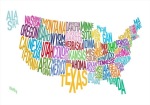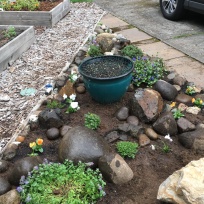To celebrate Henry Wadsworth Longfellow‘s 210th birthday today, I want to share with you a post I wrote and originally published on this blog on February 27, 2008.
 Henry Wadsworth Longfellow
Henry Wadsworth Longfellow
born February 27, 1807
Teaching young people how to read is one thing, but sparking a passion for reading is another. As a teacher, I’m highly trained in how to teach children to read, but after 22 years of teaching, I think it’s my own passion for reading that is the most powerful tool I have as I try to ignite that spark in my students. I’ve wondered exactly where my passion came from, and I’ve been able to identify a couple of things that certainly fueled the flames. One was being lovingly read to by my parents. The other was a book experience I had when I was seven or eight years old.
My father, a university professor, asked me to go with him to visit an older, retired professor in town. Dad prepared me on the drive over to this man’s house, letting me know that he was an unusual person, old and always very grumpy with people, sort of a “hermit,” he said. What he didn’t tell me was that the man was a book person extraordinaire.
I don’t think I could ever adequately describe what this man’s house was like. I walked in the front door, my father introduced us, then I looked around. I had never seen so many books in all my life. Bookshelves were everywhere and overflowing with books. Books were piled up everywhere…and I mean everywhere! The living room was completely full of books, so there was no place to sit down. The kitchen was piled high with books — the stovetop and a small space next to the sink were the only places without piles of books. The chairs and table were piled high. There were stacks of books in the bathroom, towers of books in the bedroom. Books were piled high along the hallway. Then, he took us downstairs into his basement, which was also filled with books, except that those books were on rows and rows of bookshelves, just like in a library.
Old Professor Poulson must have recognized me as a fellow book person, even though I was only eight and he was over eighty, because he very proudly showed me his entire collection, was gentle and kind to me, and before I left he gave me a book. That book has always been my most treasured book. It was a very old, lovely volume of Henry Wadsworth Longfellow’s poems, called Voices of the Night. I still read it and treasure it.
I remember spending hours and hours reading those poems and looking at the beautiful art “plates.” I memorized his poem, “The Wreck of the Hersperus,” which fascinated me, and I can still recite it today. And when my father passed away, it was a stanza from Longfellow’s “A Psalm of Life” that I chose to use during my remarks at his memorial service:
“Lives of great men all remind us
We can make our lives sublime,
And, departing, leave behind us
Footprints on the sands of time.”
Looking back, I think my Dad knew exactly what he was doing by showing me this striking example of a person’s passion for reading. It had a tremendous impact on me at a very young age! So, in searching through memories to answer the question of where my passion for reading came from, I realize that, first, my dad and mom taught me to read … and then, in so many different ways, they taught me to love reading, passionately.



































